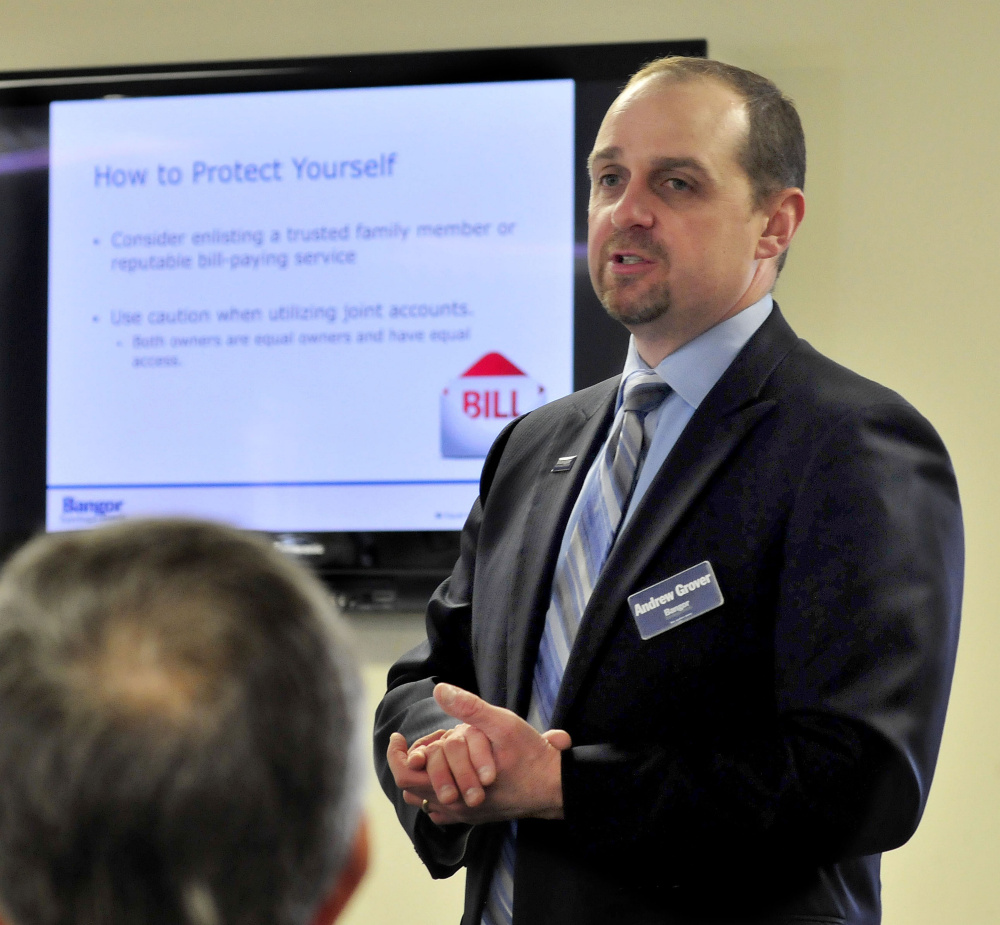CHINA — Online and phone scam attempts have become so commonplace in today’s environment, it’s not out of the ordinary to regard an unknown caller or a strange email with a hint of distrust. According to a Bangor Savings Bank official, that’s pretty much the right thing to do.
At a seminar at the China Baptist Church Vestry attended by about 20, mostly older adults, Andrew Grover, senior vice president and risk officer for the bank, said personal information is more valuable than ever in terms of fraud, so securing that information is important. In the past, fraudsters might target a person’s credit for money, but they now look to gain personal information in order to resell it again and again.
“Information is more valuable than money ever is,” he said.
Grover explained that to get fraudulent access to a person’s information — such as banking passwords, checking account numbers, debit card numbers and personal identification numbers — criminals go “phishing”: They reach out to a person by pretending to be a reputable company and coax the information out of them. They contact the victims by phone, email and even text. The criminals will ask seemingly harmless questions, such as about the subject’s date of birth and address, in order to access the person’s finances.
“They want to know everything about you and recreate it,” Grover said.
SELF-PROTECTION
One of the most well-known phishing emails involves a Nigerian prince asking for help to get a large sum of money out of Nigeria and promising you a share if you help financially in the short term. Grover said many scams are just variations of this, asking for money up front with the promise of a large reward or inheritance to come after. One problem facing the region, he said, is Maine residents are generally caring people who want to help others, which scam artists will play on.
“If it’s too good to be true, it probably isn’t (true),” he said.
Scam artists gain personal information in other ways, too. Grover said they create and email fake surveys and newsletters, often in the guise of a bank or business. Grover said since these emails might seem legitimate, it is key to make sure where the messages are coming from. They might include hyperlinks such as an “unsubscribe” tab or website link that, if clicked, could install malicious software, known as “malware,” onto a computer.
“If a question mark pops up in your head, delete it,” Grover said.
Protecting oneself from these websites is important, as they can install different types of malware on a computer. A common one, Grover explained, is known as “ransomware,” which is fairly new, but he expects it to become more prevalent this year. Ransomware locks a user off his or her computer, thereby preventing access to files. The scammers then contact the victim and say if they don’t get a ransom payment, the victim will remain locked out. This is more likely to affect bigger businesses, but he mentioned a local case in which criminals gained control of a couple’s thermostat they had programmed to their wireless network. Grover said the criminals jacked the heat up to 100 degrees Fahrenheit and demanded a ransom to unlock the thermostat.
“Where there’s convenience, there’s opportunity for fraud,” he said.
Grover said that’s why it’s important to back up a computer’s files and to make sure anti-virus software is up to date.
He also said the common perception of a scam artist is wrong. He said the scammer is not some kid in his parents’ basement looking to cause trouble. It’s now the work of call centers, full-fledged companies with employees and technology departments causing chaos. Most times these groups are overseas, but Grover said they work hard to be as convincing as possible. He called it organized crime.
A general rule of thumb Grover mentioned was if an email or phone call is unsolicited, question it. If it’s coming from an address or phone number that is unrecognizable or suspicious, he said, it’s best not to answer it. Generic phrases in emails, such as “dear sir or madam” or “your financial institution” also could be a tip-off that it’s a scam. Anyone asking the message or call recipient to send money is suspicious.
“If you have to pay money to get money, that should be a red flag,” Grover said.
Phone scams are still alive and well, according to Grover. Criminals will call claiming to be from the Internal Revenue Service, threatening arrest for tax fraud, or claiming the person called has won a prize, or claiming they to want to help the intended victim get out of debt. The thing to do in that case is just hang up, Grover said.
“If you engage these people, they will call again,” he said.
The best course of action upon receiving such an email or phone call, Grover said, is to try to verify who is behind it. Anyone who gets a message or phone call from a caller claiming to be from a bank and saying the person’s account has been compromised, Grover said, should call the bank directly. A bank won’t send a message this way, nor would any reputable organization.
These types of scams are often aimed at the elderly. A common scam involves a caller saying a person’s grandson or granddaughter is across the border, is in legal trouble and needs money. Or the caller pretends to be the grandchild and asks for money directly.
“They work off your fear,” Grover said.
A LOCAL PROBLEM
Central Maine has been hit just as hard as the rest of the state with these phone scams, and local authorities have noticed.
Waterville police Chief Joseph Massey said his department often receives calls from senior citizens or their family members about attempted scams and scam victims. Despite a number of public service announcements police have made advising people not to give out any personal information over the phone, he said, people still get tricked into giving out credit card numbers, bank account numbers and even Social Security numbers.
“Unfortunately, as much coverage as scams get, there are still those folks that get duped into giving their personal information, and they get taken for a ride,” he said.
Massey said such scams often come in waves, something Winslow police Chief Shawn O’Leary said he also has seen.
“Unfortunately, it’s not just a Winslow problem, but a state and national problem,” O’Leary said.
Both Massey and O’Leary described different kinds of scams that residents have reported.
Massey said that not long ago in one trending scam, scam artists would call up a person they knew had a grandchild and claim to be an attorney representing the grandchild, who had been arrested. The caller then asks for $5,000 for the grandchild’s bail. Massey said one couple did fall for the scam, and another who got the same call reported it to the police. After that, it was reported people were getting calls from a person claiming to be Central Maine Power Co., threatening to shut off the person’s power unless they paid a fee.
O’Leary said that like most criminals, scam artists change their tactics over time. Sometimes they call claiming to be from the IRS, then change up and claim to be that lawyer representing a family member.
These scams are becoming more commonplace as access to cellphone numbers becomes more prevalent. Grover said being on a do-not-call list is helpful but won’t protect people from criminals calling.
Massey said that in no case should people give out personal information. Credible companies, such as CMP, won’t call requesting money. Instead, they conduct their business through the mail.
O’Leary said the elderly often are targeted because they’re lonely, want someone to talk to and maybe aren’t so technologically savvy. He also thinks some of these cases go unreported because a person who has been scammed probably is embarrassed. There also might be a sense of a loss of independence if the scam is reported, as family members or caregivers might try to take some of the victim’s authority away.
“Unfortunately, a majority of these calls originate out of Maine, even out of the U.S.,” O’Leary said. “There’s no recourse on getting your money back.”
According to the Office of the Maine Attorney General, scams tend to have similar traits. The Consumer Protection Division lists a number of red flags that would indicate the caller is likely a scammer. These include being called out of the blue, the caller requesting money for something, the caller requesting personal or financial information, and being told not to tell anyone about the call.
Of course, it’s not just the elderly who can be targeted by scam artists. A recent scam has a recorded voice identifying itself as a business. Shortly thereafter, the voice asks, “Can you hear me?” If the call recipient answers “yes,” there’s a chance the call was recorded and your “yes” answer could be used for purchases.
Scams can have a long life. In January 2016, dozens of central Maine residents reported receiving calls claiming to be from IRS officials, claiming the person owes money and could be arrested if they didn’t pay.
Don’t believe it.
Colin Ellis — 861-9253
cellis@centralmaine.com
Twitter: @colinoellis
Send questions/comments to the editors.





Success. Please wait for the page to reload. If the page does not reload within 5 seconds, please refresh the page.
Enter your email and password to access comments.
Hi, to comment on stories you must . This profile is in addition to your subscription and website login.
Already have a commenting profile? .
Invalid username/password.
Please check your email to confirm and complete your registration.
Only subscribers are eligible to post comments. Please subscribe or login first for digital access. Here’s why.
Use the form below to reset your password. When you've submitted your account email, we will send an email with a reset code.